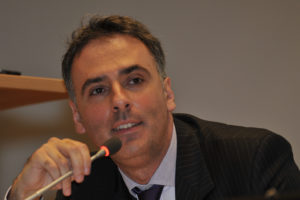This is the thesis of the book of well known Italian author, Giuseppe Sabella, in his latest book ‘Ripartenza Verde (‘Green Restart’): Industry and Globalization during the Time of COVID’ (‘Green Restart’), published by Rubbettino, an Italian publishing house which has published several books by Michael Novak.
Giuseppe Sabella is Executive Director of THINK-IN and research fellow of the Donald Lynch Foundation in North Carolina, USA. An industry expert and Think-industry4.0 project coordinator, he has collaborated and collaborates with various publications including Il Sole 24Ore, Il Sussidario and Start Magazine.
A frequent guest on Italian TV as an economic commentator, Sabella is the author of several essays on the themes of industry and work, in particular From Turin to Rome. The crisis of intermediate bodies and the future of representation , 2015 and the Metalworking Revolution. From the Fiat case to the unitary renewal of the national contract , 2017. He has also published Il Vangelo del lavoro (‘The Gospel of Work’): Ethics and Person in the Social Teaching of St. John Paul II in 2016.
 «This book,» Sabella told ZENIT, «reveals how the transformation of industry in the name of the digital and energy revolution will make our life more respectful of our common home.»
«This book,» Sabella told ZENIT, «reveals how the transformation of industry in the name of the digital and energy revolution will make our life more respectful of our common home.»
This, he said, is because «alternative energy sources, [as opposed] to fossil fuels, pollute less and stress less the the subsoil. And this is also because the digitization process puts industry in a position to produce using fewer raw materials.»
«It is no coincidence,» he shares, «that one speaks of the dematerialization of the economy.»
«For example,» he illustrated, «think about how many things are in a smartphone: not only the phone but also the calculator, the camera, the clock , the recorder, the GPS, the compass, the barometer, etc. All this means less metal, plastic, glass, silicon, etc.»
According to a press release, the book presents an «image» of post-COVID reconstruction and of the policy of relaunching production increasingly projected towards artificial intelligence and the ecological and energy transition.
The driver of change, it posits, is not ideology, «but the unpredictable evolution» of science and technology. It acknowledges that environmentalism has in fact often lent its side to anti-industrial sentiments and slowdown ‘drifts.’ «But contrary to the dominant narrative,» the book points out, «sustainability and the speed of transformation lead us to think that once the situation starts to improve and the turbulence is overcome, the digital age will be better than the industrial age.»
While acknowledging industry as a main culprit of the environmental crisis, the book clarifies however, that «at the same time, it is «the main actor that can restore balance to the planet.» The book also analyzes China and the relocation of manufacturing activities. With this in mind, the author explores how changes in production can help restore the economy and how production returning can encourage and be promoted by increased attention to values.
Moreover, Sabella’s work includes a focus on the United States, and the fifth chapter gives a very interesting overview of ecological and energy transition and sustainable industry.
Well aware that many argue against capitalism, Sabella includes some quotes about it, including, he told ZENIT, «one from the great and beloved Michael Novak.»
For the moment, the book is only in Italian but Sabella wishes to have it published in English this year.



